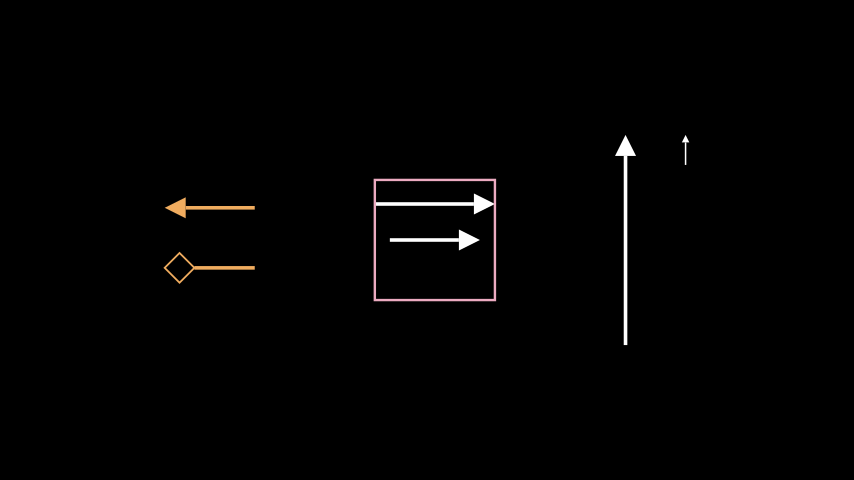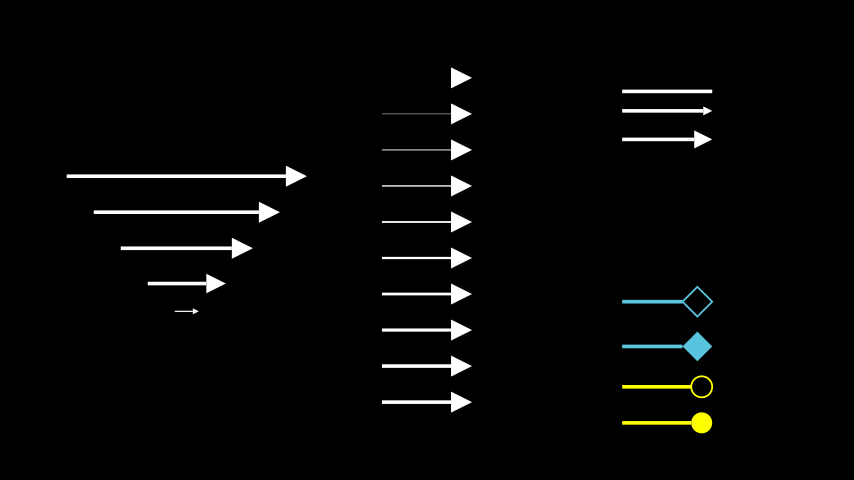箭头¶
限定名称: manim.mobject.geometry.line.Arrow
- class Arrow(*args, stroke_width=6, buff=0.25, max_tip_length_to_length_ratio=0.25, max_stroke_width_to_length_ratio=5, **kwargs)[源]¶
基类:
Line一个箭头。
- 参数:
args (任意类型) – 传递给
Line的参数。stroke_width (浮点数) – 箭头的粗细。受
max_stroke_width_to_length_ratio的影响。buff (浮点数) – 箭头与其起点和终点之间的距离。
max_tip_length_to_length_ratio (浮点数) –
tip_length随箭头的长度缩放。增加此比例会提高tip_length的最大值。max_stroke_width_to_length_ratio (浮点数) –
stroke_width随箭头的长度缩放。增加此比例会提高stroke_width的最大值。kwargs (任意类型) – 传递给
Line的附加参数。
另请参阅
ArrowTipCurvedArrow示例
示例: ArrowExample ¶

from manim import * from manim.mobject.geometry.tips import ArrowSquareTip class ArrowExample(Scene): def construct(self): arrow_1 = Arrow(start=RIGHT, end=LEFT, color=GOLD) arrow_2 = Arrow(start=RIGHT, end=LEFT, color=GOLD, tip_shape=ArrowSquareTip).shift(DOWN) g1 = Group(arrow_1, arrow_2) # the effect of buff square = Square(color=MAROON_A) arrow_3 = Arrow(start=LEFT, end=RIGHT) arrow_4 = Arrow(start=LEFT, end=RIGHT, buff=0).next_to(arrow_1, UP) g2 = Group(arrow_3, arrow_4, square) # a shorter arrow has a shorter tip and smaller stroke width arrow_5 = Arrow(start=ORIGIN, end=config.top).shift(LEFT * 4) arrow_6 = Arrow(start=config.top + DOWN, end=config.top).shift(LEFT * 3) g3 = Group(arrow_5, arrow_6) self.add(Group(g1, g2, g3).arrange(buff=2))
from manim.mobject.geometry.tips import ArrowSquareTip class ArrowExample(Scene): def construct(self): arrow_1 = Arrow(start=RIGHT, end=LEFT, color=GOLD) arrow_2 = Arrow(start=RIGHT, end=LEFT, color=GOLD, tip_shape=ArrowSquareTip).shift(DOWN) g1 = Group(arrow_1, arrow_2) # the effect of buff square = Square(color=MAROON_A) arrow_3 = Arrow(start=LEFT, end=RIGHT) arrow_4 = Arrow(start=LEFT, end=RIGHT, buff=0).next_to(arrow_1, UP) g2 = Group(arrow_3, arrow_4, square) # a shorter arrow has a shorter tip and smaller stroke width arrow_5 = Arrow(start=ORIGIN, end=config.top).shift(LEFT * 4) arrow_6 = Arrow(start=config.top + DOWN, end=config.top).shift(LEFT * 3) g3 = Group(arrow_5, arrow_6) self.add(Group(g1, g2, g3).arrange(buff=2))示例: ArrowExample ¶

from manim import * class ArrowExample(Scene): def construct(self): left_group = VGroup() # As buff increases, the size of the arrow decreases. for buff in np.arange(0, 2.2, 0.45): left_group += Arrow(buff=buff, start=2 * LEFT, end=2 * RIGHT) # Required to arrange arrows. left_group.arrange(DOWN) left_group.move_to(4 * LEFT) middle_group = VGroup() # As max_stroke_width_to_length_ratio gets bigger, # the width of stroke increases. for i in np.arange(0, 5, 0.5): middle_group += Arrow(max_stroke_width_to_length_ratio=i) middle_group.arrange(DOWN) UR_group = VGroup() # As max_tip_length_to_length_ratio increases, # the length of the tip increases. for i in np.arange(0, 0.3, 0.1): UR_group += Arrow(max_tip_length_to_length_ratio=i) UR_group.arrange(DOWN) UR_group.move_to(4 * RIGHT + 2 * UP) DR_group = VGroup() DR_group += Arrow(start=LEFT, end=RIGHT, color=BLUE, tip_shape=ArrowSquareTip) DR_group += Arrow(start=LEFT, end=RIGHT, color=BLUE, tip_shape=ArrowSquareFilledTip) DR_group += Arrow(start=LEFT, end=RIGHT, color=YELLOW, tip_shape=ArrowCircleTip) DR_group += Arrow(start=LEFT, end=RIGHT, color=YELLOW, tip_shape=ArrowCircleFilledTip) DR_group.arrange(DOWN) DR_group.move_to(4 * RIGHT + 2 * DOWN) self.add(left_group, middle_group, UR_group, DR_group)
class ArrowExample(Scene): def construct(self): left_group = VGroup() # As buff increases, the size of the arrow decreases. for buff in np.arange(0, 2.2, 0.45): left_group += Arrow(buff=buff, start=2 * LEFT, end=2 * RIGHT) # Required to arrange arrows. left_group.arrange(DOWN) left_group.move_to(4 * LEFT) middle_group = VGroup() # As max_stroke_width_to_length_ratio gets bigger, # the width of stroke increases. for i in np.arange(0, 5, 0.5): middle_group += Arrow(max_stroke_width_to_length_ratio=i) middle_group.arrange(DOWN) UR_group = VGroup() # As max_tip_length_to_length_ratio increases, # the length of the tip increases. for i in np.arange(0, 0.3, 0.1): UR_group += Arrow(max_tip_length_to_length_ratio=i) UR_group.arrange(DOWN) UR_group.move_to(4 * RIGHT + 2 * UP) DR_group = VGroup() DR_group += Arrow(start=LEFT, end=RIGHT, color=BLUE, tip_shape=ArrowSquareTip) DR_group += Arrow(start=LEFT, end=RIGHT, color=BLUE, tip_shape=ArrowSquareFilledTip) DR_group += Arrow(start=LEFT, end=RIGHT, color=YELLOW, tip_shape=ArrowCircleTip) DR_group += Arrow(start=LEFT, end=RIGHT, color=YELLOW, tip_shape=ArrowCircleFilledTip) DR_group.arrange(DOWN) DR_group.move_to(4 * RIGHT + 2 * DOWN) self.add(left_group, middle_group, UR_group, DR_group)方法
属性
animate (动画)用于动画化
self的任何方法的应用。animation_overrides (动画覆盖)颜色depth (深度)mobject 的深度。
fill_color (填充颜色)如果存在多种颜色(用于渐变),则返回第一种颜色
height (高度)mobject 的高度。
n_points_per_curve (每条曲线的点数)sheen_factor (光泽因子)stroke_color (描边颜色)width (宽度)mobject 的宽度。
- _original__init__(*args, stroke_width=6, buff=0.25, max_tip_length_to_length_ratio=0.25, max_stroke_width_to_length_ratio=5, **kwargs)¶
初始化自身。有关准确签名,请参阅 help(type(self))。
- 参数:
args (任意类型)
stroke_width (浮点数)
buff (浮点数)
max_tip_length_to_length_ratio (浮点数)
max_stroke_width_to_length_ratio (浮点数)
kwargs (任意类型)
- 返回类型:
无
- get_default_tip_length()[源]¶
返回箭头的默认尖端长度(tip_length)。
示例
>>> Arrow().get_default_tip_length() 0.35
- 返回类型:
浮点数
- get_normal_vector()[源]¶
返回向量的法线。
示例
>>> np.round(Arrow().get_normal_vector()) + 0. # add 0. to avoid negative 0 in output array([ 0., 0., -1.])
- 返回类型:
- scale(factor, scale_tips=False, **kwargs)[源]¶
缩放箭头,但保持笔画宽度和箭头尖端大小不变。
另请参阅
示例
>>> arrow = Arrow(np.array([-1, -1, 0]), np.array([1, 1, 0]), buff=0) >>> scaled_arrow = arrow.scale(2) >>> np.round(scaled_arrow.get_start_and_end(), 8) + 0 array([[-2., -2., 0.], [ 2., 2., 0.]]) >>> arrow.tip.length == scaled_arrow.tip.length True
手动使用默认方法
scale()缩放对象不具备相同的属性>>> new_arrow = Arrow(np.array([-1, -1, 0]), np.array([1, 1, 0]), buff=0) >>> another_scaled_arrow = VMobject.scale(new_arrow, 2) >>> another_scaled_arrow.tip.length == arrow.tip.length False
- 参数:
factor (浮点数)
scale_tips (布尔值)
kwargs (任意类型)
- 返回类型:
自身